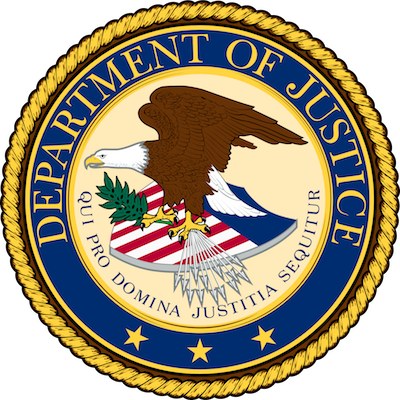Last month it came to light that the Department of Justice had reversed the 2011 DoJ opinion which stated that the 1961 Interstate Wire Act only applied to sports betting. This new judgement was apparently made in late 2018, but only surfaced recently. The new DoJ opinion says that any online gambling that takes place which involves more than one state, including casino, poker, lottery and sports betting is illegal per the Wire Act. They also said that the Unlawful Internet Gambling Enforement Act (UIGEA) does not alter the scope of the Wire Act, meaning that this opinion supersedes any provisions in the UIGEA that are contrary to the Wire Act. As such the carve outs in the UIGEA for lotteries, skill games and fantasy sports could be deemed null and void and lottery sales for interstate lotteries like Powerball will be disallowed, as will poker tournaments that involve players from New Jersey, Nevada and Delaware all participating in the same tournament. And daily fantasy sports (DFS), which involves participants from numerous states taking part in the same pools, may be deemed illegal also. Not surprisingly, the poker and daily fantasy sports sites are nervous, since they could effectively be put out of business by this decision, but even online casinos have a reason to worry. Any slot machines with jackpots that cross state boundaries (i.e. the Mega Jackpot games by IGT and Ballys) would be deemed illegal and progressive jackpots, which are interstate and are the most popular games, would be disallowed.  More concerning to all gambling companies is that the DoJ could adapt previous statements made by some in the government that the Internet is interstate by nature and hence all online gambling is illegal under this new opinion. If that’s the case, then this could just be a baby step to a major DoJ announcement that under no circumstance is online gambling of any sort permitted in the United States. John Kyl was the first person to suggest that anything on the internet was interstate in nature when introducing his 1997 Internet Gambling Prohibition Act:
More concerning to all gambling companies is that the DoJ could adapt previous statements made by some in the government that the Internet is interstate by nature and hence all online gambling is illegal under this new opinion. If that’s the case, then this could just be a baby step to a major DoJ announcement that under no circumstance is online gambling of any sort permitted in the United States. John Kyl was the first person to suggest that anything on the internet was interstate in nature when introducing his 1997 Internet Gambling Prohibition Act:
"The global information revolution has created the opportunity to gamble across state lines in a way ... the law could not have anticipated. Because of this global nature of Internet gambling, supporters of a blanket ban maintain that the federal government is in a better position than the individual states to address this issue.”
And by coincidence or not, the new DoJ opinion was only made after John McCain passed away and John Kyl took over as interim Arizona Senator.
A couple of states that have introduced online gambling or plan to have weighed in. New Jersey is furious about the new opinion, since they believe it’s another overreach by the federal government who are trying to take away states’ rights in the area of gambling. Jersey is now fighting the new judgement in the courts. And it appears that they have no plans to follow the new opinion in the interim.
Pennsylvania, on the other hand, told their casinos to indicate to the Pennsylvania Gambling Board what measures they will take to abide by the DoJ opinion. Other states thus far have not said anything. It’s almost certain that New Jersey’s appeal will end up in the Supreme Court, but while SCOTUS sided with New Jersey on its PASPA appeal, there is no indication they will do the same this time. More than likely the gambling hating Democrats Ruth Bader Ginsburg and Sonia Sotomayor will rule against New Jersey this time as they did with PASPA. However, many feel that a few of the Republican judges that ruled for New Jersey in the PASPA case were doing so on the grounds of federalism, but would not view Internet gambling in the same way.  Under this new opinion only horse racing is exempt from any interstate restrictions, thanks to the Interstate Horse Racing Act of 1978 (IHRA), which allowed for off track and simulcast betting and later included Internet betting as well. And the Restoration of America’s Wire Act (RAWA) provides a carve out for horse racing as well. The reason horse racing is being excluded is likely due to the fact that the horse racing industry said it would give up the rights granted under the IHRA "over our dead bodies," when the World Trade Organization suggested that the United States would be in compliance with WTO rules in its fight with Antigua if they made online horse racing illegal.
Under this new opinion only horse racing is exempt from any interstate restrictions, thanks to the Interstate Horse Racing Act of 1978 (IHRA), which allowed for off track and simulcast betting and later included Internet betting as well. And the Restoration of America’s Wire Act (RAWA) provides a carve out for horse racing as well. The reason horse racing is being excluded is likely due to the fact that the horse racing industry said it would give up the rights granted under the IHRA "over our dead bodies," when the World Trade Organization suggested that the United States would be in compliance with WTO rules in its fight with Antigua if they made online horse racing illegal.
The Pennsylvania decision to abide by the DoJ opinion is causing a lot of concern for the companies that purchased an online gambling license and apparently some companies are wondering whether they can get their $10 million licensing fee back. Their main concern apparently has to do with payment processing. When someone makes a credit card payment it usually isn’t processed within the state, but rather at the credit card clearing site located in another state. For example, Bank of America credit card payments are cleared from the branch in Wilmington, Delaware and Chase Manhattan clears all payments in New York. And a large number of ACH payments for most banks are dealt with in Georgia. And as for the e-Wallet solutions like Neteller and Skrill, which process payments for online New Jersey gambling transactions, the company is located in the Isle of Man. So even if the payments are made via. local merchants it’s almost inevitable that some of the transaction will cross state, if not international lines. Nevada has avoided this issue by requiring that all deposits for online poker to be made in cash at the casinos, but state analysts said that requirement is a likely reason that online poker has never gained much traction in Nevada. After all, the main appeal of online gambling is the ease and convenience of not having to go into a land-based casino.
Payment processing is the heart of all online gambling.
If the banks and e-Wallets are shut out of the process, then online gambling is doomed to fail. Gambling sites in Antigua have long said that it wasn’t the UIGEA that killed offshore gambling in the country, but rather the loss of Neteller and the decision by most U.S. banks to not deal with payments that involved Antiguan banks. I recall talking to individuals at the now defunct World Sports Exchange (WSEX) who said the death knoll of the company was when they couldn’t pay their customers. One manager at WSEX said they had the money to pay customers, but no viable means to do so. The only payout option was by check and the amount of withdrawal requests were too large to be handled by one company.
Consequently, WSEX turned to various processors, some of whom were rouge, that took the funds and left without a trace. And one company processed checks via a bank in Cyprus, which sent out checks to customers on 4x6 paper that many banks in the U.S. wouldn’t cash as they looked fake and since it was from a bank they couldn’t verify. As a result, through no fault of their own, a lot of funds were lost through fraud and a lot of customers had no way of getting properly paid. This led to complaints about no pay or slow pay and downgrades by various watchdog sites, including OSGA. It then became a vicious cycle. The site had thousands of withdrawal requests with no way of paying them, deposits slowed to a trickle and the company had major cash flow problems as well due to stolen funds. And as we know the end result was WSEX closed its operations and a manager and co-founder who felt so guilty about all that went on took his own life. Nowadays many offshore sites use cryptocurrency as payment options, but the huge volatility in the price of crypto and the recent filing of bankruptcy by Quadricacx and the announcement by the company that buyers can’t access any of their coins since the owner who died took all the passwords to the grave with him, only shows that crypto will not be a viable means of payment for casino companies in the U.S long term.
It’s pretty much accepted that the new DoJ opinion was made to appease Sheldon Adelson, who has been fighting online gambling and convinced Republican friends to introduce Restore America’s Wire Act (RAWA) in Congress. And that hasn’t been lost on some legislators. New Jersey Attorney General, Gurbir S. Grewal, filed a freedom of information request (FOIR) to find out if casino owner Sheldon Adelson had anything to do with the revised Wire Act opinion. And if it turns out that Adelson did have influence, the AG will likely try and argue in court that the DoJ was breaking the rules by allowing a private citizen to influence public decision. But what still begs the question is why Adelson has been fighting so hard to stop online gambling? After all Adelson has made his money from casino gambling and the Internet expands gambling. I spoke with a colleague in Nevada who has followed Adelson for over two decades, and he said he could answer that question pretty confidently:
"Having been acquainted with Sheldon for all these years I can say with all sincerity that Sheldon is honest. If he says that he is concerned about children, problem gamblers and fraud online then he believes that. That belief could be due to ignorance about technology given his age, but he is sincere in his concerns. But there are other unstated concerns too. I believe his concern isn’t about gambling, but rather losing hotel customers.
Let me explain. When Sheldon bought the Sands Hotel he was like everyone else in Vegas. He believed to be successful in the casino industry you had to woo customers and convince them to gamble their brains out at the casino in exchange for comps. If someone loses $2,000, they won’t feel so bad if they got a hotel stay, some food and a show or two out of it. And when the Sands was a 2-bit hotel situated next to the Desert Inn, that was true. But after Sheldon demolished the Sands to build the Venetian and especially after he put up the Palazzo, his attitude changed. He met with board members and asked why the hell the company was giving rooms worth a few hundred a night or show tickets worth a couple of hundred dollars to gamblers betting a couple of thousand dollars that they may on average make 5% from. So, around 2010 Sheldon changed his whole philosophy and announced he would no longer comp rooms, food, alcoholic beverages or show tickets to anyone but the highest rollers and it worked. Profits soared and the Venetian and Palazzo became the place to go on the strip. The best acts went there, and the uppity ups stayed there and paid the price. Thus, Sheldon started viewing himself and his company not as a casino operator, but rather as a luxury resort company. And as you know other Las Vegas companies followed suit. So, Sheldon isn’t worried that online gambling is going to hurt gambling revenue at the Sands, he’s worried that online gambling will become the norm and people in other states who make a regular trip to Las Vegas for a vacation may get bored with gambling and stay home or go to a non-gambling destination for their vacation. So yes, Sheldon is concerned that online gambling will harm his business, but it’s the hotel stays. The funny thing is outside of the United States and particularly Macau it appears the company is far more concerned with casino revenue than hotel revenues (thus why he got into the big fight with the former manager there) but that’s just the nature of the locations."
The 90 days given by the DoJ to states to adhere to the new judgment will occur in April. It’s uncertain what the majority of states will do or what he ramifications will be for not taking measures to ensure there is no interstate activity taking place online. But, one thing is certain. This new opinion is just one more headache U.S. online gambling companies don’t need.
Read insights from Hartley Henderson every week here at OSGA and check out Hartley's RUMOR MILL!








































